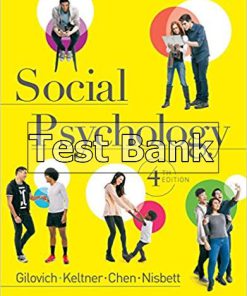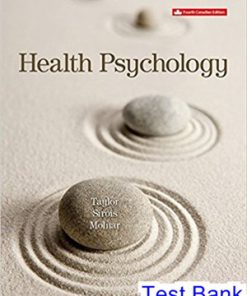Psychology 4th Edition Schacter Test Bank
You may also like
-
$26.50
$50.00 -
$26.50
$50.00
Psychology 4th Edition Schacter Test Bank

Product details:
- ISBN-10 : 1464155461
- ISBN-13 : 978-1464155468
- Author: Daniel Schacter
This widely used, enthusiastically received textbook is the work of one of the most accomplished author teams in introductory psychology, each a distinguished educator and researcher, and three of them (Schacter, Gilbert, and Wegner) authors of bestselling books for general readers. Together, they offer an approachable, engagingly written survey of the field’s main ideas, filled with unusual stories, memorable examples, and lots of humor to captivate all kinds of students.
Again carried by the authors’ exceptional communication and teaching skills, the new edition has been retooled for the classroom chapter by chapter. Sections in each chapter now have specific Learning Outcomes in place, to emphasize “big picture” concepts and guide student learning. There is also new boxed feature called A World of Difference highlighting important research on diversity and individual differences, plus new Data Visualization Activities in LaunchPad, to help students build quantitative reasoning skills.
Table contents:
- 1 The science of psychology
- The nature of psychology
- Think critically
- False news
- Social constructivism
- Psychology as a basic and applied science
- The goals of psychology
- Psychology’s broad scope: a levels-of-analysis framework
- Perspectives on behaviour
- Psychology’s roots
- Early schools: structuralism and functionalism
- The psychodynamic perspective: the forces within
- The behavioural perspective: the power of the environment
- The Monster Study
- The humanistic perspective: self-actualization and positive psychology
- The cognitive perspective: the thinking human
- The sociocultural perspective: the embedded human
- Behaviour genetics
- Research close-up Do owners look like their dogs?
- The biological perspective: the brain, genes and evolution
- Using levels of analysis to integrate the perspectives
- An example: understanding depression
- Summary of major themes
- Psychology today
- A global science and profession
- Psychology and public policy
- Current issues in psychology
- Psychology and your life
- Applying psychological science How to enhance your academic performance
- Psychology at work
- Psychology at work Emma Young, Science and Health Journalist
- 2 Studying behaviour scientifically
- Scientific principles in psychology
- Scientific attitudes
- Gathering evidence: steps in the scientific process
- Two approaches to understanding behaviour
- Defining and measuring variables
- Ethical principles in research
- Ethical standards in human research
- Ethical standards in animal research
- Current issues Where we can’t trust the data, we can’t trust the subject
- Methods of research
- Descriptive research: recording events
- Correlational research: measuring associations between events
- Research close-up Seasonal affective disorder
- Experiments: examining cause and effect
- Qualitative research
- Mixed-methods design
- Threats to the validity of research
- Confounding of variables
- Demand characteristics
- Placebo effects
- Experimenter expectancy effects
- Replicating and generalizing the findings
- Current issues The ‘replication crisis’
- Science, psychics and the paranormal
- Analysing and interpreting data
- Current issues Consuming statistics
- Using statistics to describe data
- Using statistics to make inferences
- Meta-analysis: combining the results of many studies
- Critical thinking in science and everyday life
- Applying psychological science Evaluating claims in research and everyday life
- 3 Evolution, genes, environment and behaviour
- Evolution by natural selection
- Natural selection
- Mendelian genetics
- Eugenics
- Genes and chromosomes
- Inherited behavioural adaptations
- Ethology
- Behavioural genetics
- Adoption and twin studies
- Genes, environment and intelligence
- Genes, environment and personality
- Gene–environment interactions
- Gene–environment correlation
- Genetic manipulation and control
- Current issues To know or not to know: genetic screening
- Genetic screening
- Evolution and human nature
- For the good of the gene
- Applying psychological science Happiness promotes our social relationships
- Evolutionary approaches to human mate choice
- Research close-up Sex differences in the ideal mate: evolution or social roles?
- Evolutionary approaches to personality
- 4 The brain and behaviour
- The nervous system
- The peripheral nervous system
- The central nervous system
- Neurons
- The electrical activity of neurons
- How neurons communicate: synaptic transmission
- Neurotransmitters
- Specialized transmitter systems
- Applying psychological science Understanding how drugs affect your brain
- Unlocking the secrets of the brain
- Neuropsychology
- Electrical recording
- Brain imaging
- Brain stimulation
- Current issues Brain or machine?
- The hierarchical brain: structures and behavioural functions
- The hindbrain
- The midbrain
- The forebrain
- Research close-up Inside the brain of a psychopath
- Hemispheric lateralization: the left and right brains
- The split brain: dividing the hemispheres
- Plasticity in the brain: the role of experience and the recovery of function
- How experience changes the brain
- Healing the nervous system
- The nervous system interacts with the endocrine and immune systems
- Interactions with the endocrine system
- Interactions involving the immune system
- 5 Sensation and perception
- Sensory processes
- Stimulus detection: the absolute threshold
- Signal detection theory
- The difference threshold
- Sensory adaptation
- The sensory systems
- Vision
- Audition
- Taste and smell: the chemical senses
- Touch: sensing the skin and the body
- Applying psychological science Sensory prosthetics
- Multisensory processing
- Research close-up Illusory visual completion of an object can make your finger feel shorter
- Perception: the creation of experience
- Bottom-up and top-down perceptual processing
- Perceptions have organization and structure
- Perception involves hypothesis testing
- Perception of constant objects, depth, distance and movement
- Object constancy
- Depth and distance perception
- Perception of movement
- Illusions: false perceptual hypotheses
- Research close-up Stalking a deadly illusion
- Face perception
- The role of facial features and their configurations
- Emotion
- Attractiveness
- Recognizing faces
- Experience, critical periods and perceptual development
- Cross-cultural research in perception
- Current issues Cross-cultural differences in multisensory perceptions
- Critical periods: the role of early experience
- Restored sensory capacity
- 6 Consciousness
- The puzzle of consciousness
- Characteristics of consciousness
- Measuring states of consciousness
- Levels of consciousness
- Unconscious perception and influence
- Why do we have consciousness?
- The neural basis of consciousness
- Attention
- Focused attention
- Divided attention
- Inattention and change blindness
- Circadian rhythms: our daily biological clocks
- Keeping time: brain and environment
- Environmental disruptions of circadian rhythms
- Applying psychological science Outsmarting jet lag, night-work disruptions and winter depression
- Sleep and dreaming
- Stages of sleep
- Getting a night’s sleep: from brain to culture
- How much do we sleep?
- Why do we sleep?
- Sleep disorders
- The nature of dreams
- Current issues Lucid dreaming
- Daydreams and waking fantasies
- Drug-induced states
- Drugs and the brain
- Drug tolerance and dependence
- Depressants
- Research close-up Alcohol + driving: an accident waiting to happen
- Stimulants
- Opiates
- Hallucinogens
- Marijuana
- From genes to culture: determinants of drug effects
- Hypnosis
- The scientific study of hypnosis
- Hypnotic behaviours and experiences
- Theories of hypnosis
- The hypnotized brain
- 7 Learning: the role of experience
- Adapting to the environment
- Habituation and sensitization
- Classical conditioning: associating one stimulus with another
- Pavlov’s pioneering research
- Basic principles
- Applications of classical conditioning
- Operant conditioning: learning through consequences
- Thorndike’s law of effect
- Skinner’s analysis of operant conditioning
- Antecedent conditions and consequences
- Shaping and chaining: taking one step at a time
- Generalization and discrimination
- Schedules of reinforcement
- Escape and avoidance conditioning
- Applications of operant conditioning
- Applying psychological science Using operant principles to modify your behaviour
- Challenges to behaviourism
- Biological constraints: evolution and preparedness
- Cognition and conditioning
- Cognitive and behavioural learning in psychological therapies
- Observational learning: when others show the way
- Psychology at work Rachel Browning, Speech and Language Therapist
- Bandura’s social-cognitive theory
- Current issues Imitation: babies’ brains respond to watching others’ actions
- Applications of observational learning
- Current issues Applications of observational learning in neurorehabilitation
- The adaptive brain
- Learning through connections
- Where does learning happen in the brain?
- 8 Memory
- Memory as information processing
- A three-stage model
- Encoding: entering information
- Effortful and automatic processing
- Levels of processing: when deeper is better
- Exposure and rehearsal
- Organization and imagery
- How prior knowledge shapes encoding
- Encoding and exceptional memory
- Storage: retaining information
- Memory as a network
- Types of long-term memory
- Retrieval: accessing information
- The value of multiple cues
- The value of distinctiveness
- Arousal, emotion and memory
- Flashbulb memories: fogging up the picture?
- Confidence and memory accuracy
- The effects of context, state and mood on memory
- Forgetting
- The course of forgetting
- Why do we forget?
- Forgetting to do things: prospective memory
- Amnesia
- Memory as a constructive process
- Research close-up Metamemory: can children predict how good their memory will be?
- Memory distortion and schemas
- Misinformation effects and eyewitness testimony
- The child as eyewitness
- Current issues The recovered or false memory controversy
- False confessions
- Culture and memory construction
- Memory and the brain
- Where are memories formed and stored?
- How are memories formed?
- Applying psychological science Improving memory and academic learning
- 9 Language and thinking
- Language
- Adaptive functions of language
- Properties of language
- The structure of language
- Understanding and producing language
- Research close-up The role of context in reading: evidence from reading times
- Acquiring a first language
- Bilingualism and multilingualism
- Linguistic influences on thinking
- Thinking
- Thought, brain and mind
- Concepts and propositions
- Reasoning
- Current issues What does it mean to be rational?
- Problem-solving and decision-making
- Applying psychological science Guidelines for creative problem-solving
- Knowledge, expertise and wisdom
- Mental imagery
- Metacognition: knowing your own cognitive abilities
- Research close-up ‘Why did I get that wrong?’ Improving college students’ awareness of whether they understand text material
- 10 Intelligence
- Intelligence in historical perspective
- Sir Francis Galton: quantifying mental ability
- Alfred Binet’s mental tests
- Binet’s legacy: an intelligence-testing industry emerges
- The nature of intelligence
- The psychometric approach: the structure of intellect
- Cognitive process approaches: the nature of intelligent thinking
- Broader conceptions of intelligence: beyond mental competencies
- The measurement of intelligence
- Increasing the informational yield from intelligence tests
- Theory-based intelligence tests
- Should we test for aptitude or achievement?
- Psychometric standards for intelligence tests
- Assessing intelligence in non-Western cultures
- Heredity, environment and intelligence
- Current issues Genetics, the environment and intelligence
- Applying psychological science Early-childhood interventions: a means of boosting intelligence?
- Group differences in intelligence
- Sex differences in cognitive abilities
- Beliefs, expectations and cognitive performance
- Research close-up Dietary patterns in childhood and IQ
- Extremes of intelligence
- The intellectually gifted
- A concluding thought
- 11 Motivation and emotion
- Motivation
- Theories of motivation
- Hunger and weight regulation
- Current issues What causes anorexia?
- Sexual motivation
- Social motivation
- Achievement motivation
- Psychology at work Jeremy Snape, Sport Psychologist
- Motivational conflict
- Emotion
- Thinking about emotion
- The nature of emotions
- Theories of emotion
- Research close-up Cognition–arousal relations: two classic experiments
- Cognitive theories of emotion
- Happiness
- Applying psychological science Being happy: guidelines from psychological research
- A concluding thought
- 12 Lifespan development I: physical and cognitive development
- The scope of developmental psychology
- Linking social and cognitive development
- Major issues and methods in developmental psychology
- Prenatal development
- Genetics and epigenetics
- Threats to prenatal development
- Infancy and childhood
- The world of the newborn
- Research close-up The development of face discrimination in the first year of life
- The developing brain and body
- Current issues What is the role of the brain in development?
- Cognitive development
- Applying psychological science Applying principles from cognitive development to produce better educational techniques
- Psychology at work Dr Emily Prince, Educational Psychologist
- Adolescence, adulthood and old age
- Biological changes
- Cognitive changes
- 13 Lifespan development II: social and emotional development
- Infancy and early childhood
- Newborn emotions and emotional development
- Personality development
- Social development and attachment
- Applying psychological science Understanding the effects of childcare on social-emotional development
- Moral development
- Current issues Are we born prosocial?
- Adolescence, adulthood and old age
- Social-emotional development in adolescence
- Social-emotional development in adulthood
- Research close-up What does it take to become an adult?
- Social-emotional development in old age
- 14 Personality
- What is personality?
- The psychodynamic perspective
- Freud’s psychodynamic theory
- Neoanalytic and object relations approaches
- Evaluating the psychodynamic approach
- Research close-up Attachment style and abusive romantic relationships
- The phenomenological-humanistic perspective
- George Kelly’s personal construct theory
- Carl Rogers’s theory of the self
- Research on the self
- Evaluating the phenomenological-humanistic approach
- Mapping the structure of personality
- Types and traits of personality
- Lexical and factor analytic approaches
- Stability of personality traits
- Current issues How many personality factors are there?
- Evaluating the trait approach
- Biological foundations of personality
- Genetics and personality
- Personality and the nervous system
- Evaluating the biological approach
- Behavioural and social-cognitive theories
- Rotter: expectancy, reinforcement value and locus of control
- Albert Bandura: social learning and self-efficacy
- Applying psychological science Increasing self-efficacy through systematic goal setting
- Mischel and Shoda’s cognitive-affective personality system
- Reconciling personality coherence with behavioural inconsistency
- Evaluating social-cognitive theories
- Culture, gender and personality
- Culture differences
- Gender differences
- Personality assessment
- Interviews
- Behavioural assessment
- Experience sampling
- Personality scales
- Psychology at work Caoimhe McAnena, Forensic Psychologist
- Projective tests
- 15 Social thinking and behaviour
- Social thinking
- Attribution: perceiving the causes of behaviour
- Forming and maintaining impressions
- Psychology at work Jenny Packwood, Head of Brand Engagement, KFC (Kentucky Fried Chicken)
- Self-concept
- Attitudes and attitude change
- Psychology at work Mareille de Bloois, Authority for Consumers and Markets (ACM), the Netherlands
- Concluding remarks
- Social influence and behaviour in groups
- The mere presence of others
- Compliance
- Research close-up The dilemma of obedience: when conscience confronts malevolent authority
- Social influence in groups
- Behaviour in groups
- Social relations: intergroup dynamics
- Understanding intergroup relations
- Prejudice and discrimination
- Social relations: interpersonal dynamics
- Attraction: liking and loving others
- Applying psychological science Making close relationships work: lessons from psychological research
- Pro-social behaviour: helping others
- Current issues Does pure altruism exist?
- Aggression: harming others
- 16 Health psychology: adjusting to life
- Stress and well-being
- Stressors
- The stress response: a mind–body link
- Effects of stress on well-being
- Psychology at work Defne Yener, Organizational Development Consultant
- Factors that influence stress–health relations
- Coping with stress
- Effectiveness of coping strategies
- Stress-management training
- Pain and pain management
- Biological mechanisms of pain
- Psychological influences on pain
- Applying psychological science Psychological techniques for controlling pain and suffering
- Health promotion and illness prevention
- Research close-up The psychological roots of anti-vaccination attitudes: a 24-nation investigation
- How people change: health behaviour theories
- Health-enhancing behaviours
- Health-threatening behaviours
- Maintaining positive behaviour change
- Current issues Public health messages and stigma
- A concluding thought
- 17 Psychological disorders
- Historical perspectives on deviant behaviour
- Defining and classifying psychological disorders
- What is ‘abnormal’?
- Diagnosing psychological disorders
- Consequences of diagnostic labelling
- Anxiety disorders
- Phobic disorder
- Generalized anxiety disorder
- Panic disorder
- Obsessive-compulsive disorder
- Post-traumatic stress disorder
- Causal factors in anxiety disorders
- Somatoform and dissociative disorders: anxiety inferred
- Somatoform disorders – somatic symptom disorders
- Dissociative disorders
- Mood disorders
- Depression
- Bipolar disorder
- Prevalence and course of mood disorders
- Causal factors in mood disorders
- Applying psychological science Understanding and preventing suicide
- Schizophrenia
- Characteristics of schizophrenia
- Causal factors in schizophrenia
- Personality disorders
- Antisocial personality disorder
- Research close-up Fear, avoidance learning and psychopathy
- Borderline personality disorder
- Childhood disorders
- Attention deficit/hyperactivity disorder
- Current issues The drugs don’t work – or do they?
- Autism spectrum disorder (asd)
- A concluding thought
- 18 Treatment of psychological disorders
- Psychological treatments
- Professional bodies and organizations
- Psychodynamic therapies
- Psychoanalysis
- Brief psychodynamic and interpersonal therapies
- Object relations theory
- Humanistic psychotherapies
- Client-centred therapy
- Gestalt therapy
- Cognitive therapies
- Ellis’s rational-emotive therapy
- Psychology at work Windy Dryden, leading Rational-Emotive Cognitive Behaviour Therapy (recbt) therapist
- Beck’s cognitive therapy
- Behaviour therapies
- Exposure: an extinction approach
- Systematic desensitization: a counter-conditioning approach
- Research close-up Exposure and response prevention (erp) in obsessive compulsive disorder
- Aversion therapy
- Operant conditioning treatments
- Modelling and social skills training
- Group, family and marital therapies
- Family therapy
- Marital therapy
- Cultural and gender issues in psychotherapy
- Cultural factors in treatment utilization
- Applying psychological science Comparative psychology of depression
- Gender issues in therapy
- Evaluating psychotherapies
- Eysenck’s great challenge
- Current issues Regression to the mean
- Psychotherapy research methods
- Factors affecting the outcome of therapy
- Biological approaches to treatment
- Drug therapies
- Do antidepressant drugs work?
- Electroconvulsive therapy
- Psychosurgery
- Mind, body and therapeutic interventions
- Psychological disorders and society
- Deinstitutionalization
- Mental health treatment in a managed health-care environment
- Preventative mental health
- References
- Name Index
- Subject Index
People also search:
Psychology
Psychology 4th
Psychology 4th Edition
Psychology 4th Edition download free pdf
Psychology 4th Edition pdf












